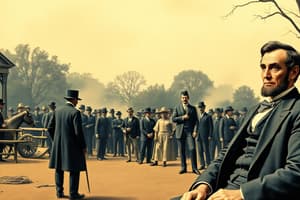Podcast
Questions and Answers
What was the catalyst that led Abraham Lincoln to develop a strong sense of ambition and desire to escape from certain traits?
What was the catalyst that led Abraham Lincoln to develop a strong sense of ambition and desire to escape from certain traits?
- His father's encouragement and support
- The death of his mother at a young age (correct)
- Losing the election to Stephen Douglas
- Meeting Mary Todd in Springfield
In which year did Abraham Lincoln pass the bar and move to Springfield?
In which year did Abraham Lincoln pass the bar and move to Springfield?
- 1840
- 1837 (correct)
- 1842
- 1835
What was the initial reason for the American Civil War, according to Abraham Lincoln?
What was the initial reason for the American Civil War, according to Abraham Lincoln?
- To expand the country's territory
- To preserve states' rights
- To abolish slavery
- To maintain the Union (correct)
What was the significance of January 1, 1863, in the context of Abraham Lincoln's presidency?
What was the significance of January 1, 1863, in the context of Abraham Lincoln's presidency?
Where did Abraham Lincoln meet his future wife, Mary Todd?
Where did Abraham Lincoln meet his future wife, Mary Todd?
What was the outcome of Abraham Lincoln's challenge to Stephen Douglas for his seat in the US Senate?
What was the outcome of Abraham Lincoln's challenge to Stephen Douglas for his seat in the US Senate?
What event occurred on April 14, 1865, which had a significant impact on the nation's Reconstruction era?
What event occurred on April 14, 1865, which had a significant impact on the nation's Reconstruction era?
What was the consequence of Abraham Lincoln's death on the nation's future, according to the content?
What was the consequence of Abraham Lincoln's death on the nation's future, according to the content?
Flashcards are hidden until you start studying
Study Notes
Early Life and Personality
- Abraham Lincoln was born on February 12, 1809, in a log cabin in rural Kentucky.
- His mother's death when he was nine years old deeply affected him and strained his relationship with his father.
- Lincoln regarded his father as lacking ambition, lazy, and anti-intellectual, which motivated him to escape from these traits.
- Despite these challenges, Lincoln developed into an intelligent, well-spoken, and popular young man.
Career and Politics
- Lincoln worked a series of odd jobs in New Salem, Illinois, where he was known for his wisdom and popularity.
- He taught himself law, passed the bar in 1837, and moved to Springfield, where he met Mary Todd.
- Lincoln was elected to the Illinois State Legislature and later challenged Stephen Douglas for his seat in the US Senate, losing the election but gaining national recognition.
- He won the Republican Party's nomination for president in 1860 and went on to win the election.
Presidency and the American Civil War
- Lincoln's views on slavery did not make him a welcomed leader in the South, and by his inauguration in March 1861, seven southern states had seceded from the Union.
- The Confederacy fired on Fort Sumter, starting the American Civil War in April 1861.
- Initially, Lincoln made the war about maintaining the Union, but eventually shifted the cause to abolishing slavery.
- On January 1, 1863, Lincoln issued the Emancipation Proclamation, declaring an end to slavery.
Assassination and Legacy
- Lincoln was assassinated on April 14, 1865, by John Wilkes Booth at Ford's Theatre in Washington DC.
- Lincoln's death occurred at a critical time for the nation, which needed his leadership during the Reconstruction era.
- His legacy might have prevented the need for the civil rights movement and figures like Martin Luther King Jr.
Early Life and Personality
- Born on February 12, 1809, in a rural Kentucky log cabin
- Mother's death at age 9 deeply affected him and strained his relationship with his father
- Regarded his father as lacking ambition, lazy, and anti-intellectual, which motivated him to escape from these traits
- Developed into an intelligent, well-spoken, and popular young man despite these challenges
Career and Politics
- Worked odd jobs in New Salem, Illinois, where he was known for his wisdom and popularity
- Taught himself law, passed the bar in 1837, and moved to Springfield
- Met Mary Todd in Springfield
- Elected to the Illinois State Legislature
- Challenged Stephen Douglas for his seat in the US Senate, losing the election but gaining national recognition
- Won the Republican Party's nomination for president in 1860 and went on to win the election
Presidency and the American Civil War
- Views on slavery made him unwelcome in the South, leading to seven southern states seceding from the Union by his inauguration in March 1861
- The Confederacy fired on Fort Sumter, starting the American Civil War in April 1861
- Initially made the war about maintaining the Union, but eventually shifted the cause to abolishing slavery
- Issued the Emancipation Proclamation on January 1, 1863, declaring an end to slavery
Assassination and Legacy
- Assassinated on April 14, 1865, by John Wilkes Booth at Ford's Theatre in Washington DC
- Death occurred at a critical time for the nation, which needed his leadership during the Reconstruction era
- Legacy might have prevented the need for the civil rights movement and figures like Martin Luther King Jr.
Studying That Suits You
Use AI to generate personalized quizzes and flashcards to suit your learning preferences.




